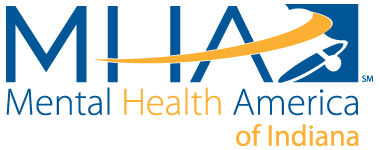Agenda
time
title
session/speaker/abstract
MORNING SESSIONS
9:00 AM – 9:15 AM
Welcome Remarks
(In-Person & Livestream)
Watch on: Mainstage
Liberty Hall
Steve McCaffrey, President & CEO, Mental Health America of Indiana
Leslie Hulvershorn, MD, IU Department of Psychiatry
9:15 AM – 10:00 AM
Morning Keynote
(In-Person & Livestream)
Watch on: Mainstage
Liberty Hall
Tackling the Mental Health & Criminal Justice Intersection
Steve Strakowski, MD
Professor and Vice Chair, Research
Indiana University School of Medicine
10:00 AM – 10:15 AM
BREAK & EXHIBIT HALL
10:15 AM – 11:00 AM
Morning Session
(In-Person & Livestream)
Watch on: Mainstage
Liberty Hall
The Economic Burden of Untreated Mental Illness in Indiana
Heather Taylor, PhD, MPH, RDH
Assistant Professor
Indiana University Richard M. Fairbanks School of Public Health
10:15 AM – 11:00 AM
Morning Session
(In-Person Only)
Veterans Hall 1
Firearms, Violence, and Mental Illness
Dr. George Parker, MD
Professor of Clinical Psychiatry
Indiana University School of Medicine
10:15 AM – 11:00 AM
Morning Session
(In-Person Only)
Veterans Hall 2
Justice Involved Youth and Addiction Treatment: Lessons Learned from Indiana
Matthew Aalsma, PhD, HSPP
Professor of Pediatrics
Director of the Adolescent Behavioral Health Research Program
Indiana University School of Medicine
10:15 AM – 11:00 AM
Morning Session
(In-Person Only)
Veterans Hall 3
How our Brain Handles Challenges, and How That Leaves Us Vulnerable to Addiction and Anxiety
Frederic (Woody) Hopf, PhD
Professor, Psychiatry Dept
Indiana University School of Medicine
10:15 AM – 11:00 AM
Morning Session
(In-Person Only)
Veterans Hall 4
Substance Use Disorder in the Postpartum Period: A Case for Greater Focus on this Critical Time
Dr. Camila Arnaudo, MD
Addictions Treatment Recovery Center
IU Health Bloomington Hospital
11:00 AM – 11:15 AM
BREAK & EXHIBIT HALL
HEROES FOR RECOVERY LUNCHEON & AWARDS CEREMONY WELCOME REMARKS
11:15 AM – 11:45 AM
2022 Heroes Testimonial
(In-Person & Livestream)
Watch on: Mainstage
Liberty Hall
Heroes for Recovery Testimonial
Lt. Governor, Suzanne Crouch
State of Indiana
11:45 AM – 12:45 PM
2022 Heroes for Recovery Luncheon
(In-Person & Livestream)
Watch on: Mainstage
Liberty Hall
2022 Heroes for Recovery Award Winners
Emceed by MHAI Board Chair
12:45 PM – 1:00 PM
BREAK & EXHIBIT HALL
AFTERNOON SESSIONS
1:00 PM – 1:15 PM
Afternoon Keynote
(In-Person & Livestream)
Watch on: Mainstage
Liberty Hall
Indiana Behavioral Health Commission Presentation
Jay Chaudhary
Director, Division of Mental Health and Addiction
1:15 PM – 1:45 PM
Afternoon Keynote Panel
(In-Person & Livestream)
Watch on: Mainstage
Liberty Hall
Behavioral Health Commission Report Panel Discussion
Members of the Indiana Behavioral Health Commission
Panel Moderated by Steve McCaffrey
1:45 PM – 2:00 PM
BREAK & EXHIBIT HALL
2:00 PM – 2:10 PM
Afternoon Session
(In-Person & Livestream)
Watch on: Mainstage
Liberty Hall
Sharing a Personal Story
Moser Family
2:00 PM – 2:45 PM
Afternoon Session
(In-Person & Livestream)
Watch on: Mainstage
Liberty Hall
Indiana’s 988 and Crisis Response System: Seizing the Opportunity of a Lifetime
Christopher Drapeau
Executive Director of Prevention, Suicide Prevention and Crisis Response
Division of Mental Health & Addiction/FSSA
2:00 PM – 2:45 PM
Afternoon Session
(In-Person Only)
Veterans Hall 1
Collaborative Care: Improving Access to High Quality Mental Health Treatment
Emily Holmes, MD, MPH
Assistant Professor of Clinical Psychiatry
Indiana University School of Medicine
2:00 PM – 2:45 PM
Afternoon Session
(In-Person Only)
Veterans Hall 2
Indiana Statewide Implementation of Multisystemic Therapy (MST)
Gabriela M. Rodríguez, PhD, HSPP
Assistant Professor of Clinical Psychiatry
Indiana University School of Medicine
2:00 PM – 2:45 PM
Afternoon Session
(In-Person Only)
Veterans Hall 3
A Light in the Storm: Expanding Access to Trauma-Focused Services for Youth and Families through the Indiana INTREPID Center
Zachary Adams, PhD, HSPP
Clinical Psychologist & Assistant Professor of Psychiatry
IU Department of Psychiatry and IU Health/Riley Children’s Hospital
2:00 PM – 2:45 PM
Afternoon Session
(In-Person Only)
Veterans Hall 4
IN RCO Certification
Heather Rodriguez, MSW, CAPRC II
Director of the Indiana Recovery Network
Manager of Recovery Community Development with Indiana Addictions Issues Coalition
Indiana Suicide Prevenetion Network Mini Conference Agenda
Agenda
time
title
session/speaker/abstract
MORNING SESSIONS
10:15 AM – 11:00 AM
Morning Session
(In-Person Only)
Veterans Hall 5
Story of Recovery, Resilience and Family Healing
1SG(R) Tom Cruz
Director Pathways to H.O.P.E
One CommunityUSA
10:15 AM – 11:00 AM
Morning Session
(In-Person Only)
Salon 6
The “Alternatives to Suicide” Approach to Crisis: Imagination, Common Sense, and Reducing Harm
Caroline Mazel-Carlton
Director of Training, Wildflower Alliance
10:15 AM – 11:00 AM
Morning Session
(In-Person Only)
Salon 7
Developing Digital Safe Spaces For Black Mental Health
Brandon J. Johnson, MHS, MCHES
Creator, The Black Mental Wellness Lounge
10:15 AM – 11:00 AM
Morning Session
(In-Person Only)
Salon 8
Safety Equals Trust
Rossville Student Ambassadors: Ariel Abbott, Emersyn Hill, Simon Wilson, and Payne Terry (Teachers: Erin Dillingham and Emily Vanderwall)
Student Leaders, Rossville Middle/High School
AFTERNOON SESSIONS
2:00 PM – 2:45 PM
Afternoon Session
(In-Person Only)
Veterans Hall 5
Power of the Peer-Led Model: Empowering Youth to Fight Mental Health Stigma
Karin Gilbert
Regional Program Manager – Indiana
Bring Change to Mind
2:00 PM – 2:45 PM
Afternoon Session
(In-Person Only)
Salon 6
Agriculture and Mental Health: Supporting our Farmers for a Healthier Harvest
Emily Kresca
Agriculture and Natural Resources Extension Educator
Purdue Extension – Kosciusko County
2:00 PM – 2:45 PM
Afternoon Session
(In-Person Only)
Salon 7
LOSS Teams 101: What are they, why are they important
Alice Jordan-Miles
Director
Purdue University Fort Wayne – Behavioral Health and Family Studies Institute
2:00 PM – 2:45 PM
Afternoon Session
(In-Person Only)
Salon 8
Peer Support in the Fire Service
Tim Gallagher
Peer Support Coordinator, Media and Comms L416
Indianapolis Professional Firefighters Local 416 and Wayne Township Fire Department
2:45 PM – 3:00 PM
BREAK & EXHIBIT HALL
3:00 PM – 3:15 PM
Afternoon Session
(In-Person & Livestream)
Watch on: Mainstage
Liberty Hall
Closing Remarks
Steve McCaffrey, President & CEO
Mental Health America of Indiana
